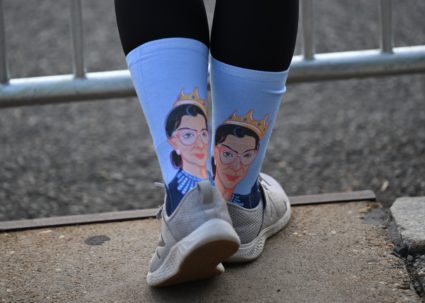
After RBG's death, this poet urges us to follow in her steps
For nearly 15 years, Rosemerry Wahtola Trommer has written a poem a day. When she got home Friday, with Ruth Bader Ginsburg's death heavy on her mind, she hadn't penned one yet. She began to read news stories, looking for inspiration in the justice's own words.
One quote stuck out. In the 2018 documentary "Notorious RBG," Ginsburg said that societal change is incremental. "Real change, enduring change, happens one step at a time," she added.
In writing her poem, "In the Steps of RBG," Trommer's message was: "Wow, you did it. And now, it's our turn."
Trommer first heard the news when a friend told her in person on Friday. Arriving for an outdoor visit, her friend was carrying flowers, which seemed like an appropriate coincidence. Both stood there, feeling the magnitude of the moment.
That night, Trommer got a flurry of texts — from friends and acquaintances — looking to connect. Trommer said she sensed an "upwelling of emotion and sense of loss" for the champion of gender equality and the court's second female justice. Trommer said she hadn't ever cried for a national figure before, but Ginsburg's death was different.
Trommer wrote "In the Steps of RBG" after finding a quote from the late justice on the way societal change happens one step at a time. Video by PBS NewsHour
The poet called the late justice a "bridge-builder" who had a profound impact on the country. Trommer thinks not only of Ginburg's legal expertise with the Supreme Court and the American Civil Liberties Union, but also her "commitment to finding equality" in the Constitution.
She said she feels profound gratitude when she thinks "about the difference between my daughter's life and my life and my mother's life and just how very different opportunities are, for the three of us." Trommer noted, for example, how Ginsburg hid her pregnancy while teaching at Rutgers School of Law in the 1960s, a once-common career-ender for women that has improved over time.
Trommer said she admired Ginsburg for showing others how to fight with integrity, as well as the kind of patience that didn't try for a "grand sweep" of changes — and she did this "without ever raising her voice, without being nasty." Part of Ginsburg's legacy, Trommer added, was how she was respectful with people who disagreed with her, finding ways to talk with them.
"I know that the only person who I really have any control over is me," Trommer said, adding that it was important for her poem, "In the Steps of RBG," to be about each person making this decision for themselves that "that we are willing to take steps as individuals and then together."
One line notes that "if there's little joy, let me step anyway."
Trommer said the line points to how, in a "pleasure-driven society," we want to do things that feel good. "If it doesn't feel good, then maybe we don't want to keep going."
But poems can envision where we are now, as well as where we're headed, Trommer said, and it is important to keep going "no matter how tired we are, no matter how frustrated we might be, or how hopeless it might feel."
In the Steps of RBG
So let me take one step right now,
one step toward respect.
And give me strength to take another
toward clarity. And though
my feet might feel like stones, let
me take another step toward justice.
And another toward equity. And another
toward truth. And though my legs
may feel leaden and slow, though someone
else may step on my toes, may I inch
toward forgiveness. May every step
be toward a bridge. Enough divisiveness.
And as I go, may I find joy in the stepping,
grace in the edging toward great change.
But if there's little joy, let me step anyway.
Then take another step. And another. And another.
Trommer, who's based in Placerville, Colorado, teaches poetry for addiction recovery programs, hospice, and different retreats. Trommer's latest poetry collection, "Hush," was published earlier this year. It was this year's winner of the Halcyon Prize for poems of human ecology.
READ MORE: How two poets are nurturing support networks disrupted by the pandemic
Support Canvas
Sustain our coverage of culture, arts and literature.



















